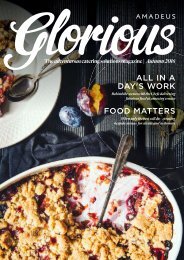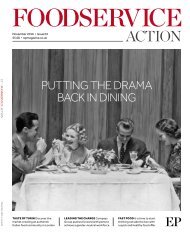EP Business in Hospitality Issue 49 - April 2014
EP magazine provides a reference point for executives on topical issues which may impact business growth, industry structure, professional and skill development, and broader economic and political changes. The magazine reports on all sectors of the industry, including hotels, restaurants, events and foodservice (contract catering).
EP magazine provides a reference point for executives on topical issues which may impact business growth, industry structure, professional and skill development, and broader economic and political changes. The magazine reports on all sectors of the industry, including hotels, restaurants, events and foodservice (contract catering).
Create successful ePaper yourself
Turn your PDF publications into a flip-book with our unique Google optimized e-Paper software.
CAMPAIGN<br />
Focus on<br />
healthcare<br />
There is no deny<strong>in</strong>g that there<br />
is a problem with today’s<br />
hospital food. Statistics from<br />
the NHS showed figures from<br />
2008-2012 stat<strong>in</strong>g that there<br />
were days when hospitals threw out 82,000<br />
meals, or almost 25 per cent of their meals.<br />
What heights will the numbers reach<br />
before there is a cause for change? While<br />
the reasons beh<strong>in</strong>d why there is so much<br />
food wastage are debated, the follow<strong>in</strong>g are<br />
suggestions from some hospital trusts:<br />
<br />
<br />
presented<br />
<br />
can get <strong>in</strong>terrupted for an exam<strong>in</strong>ation<br />
<br />
<br />
teams result<strong>in</strong>g <strong>in</strong> the <strong>in</strong>correct meals<br />
<br />
<br />
discharged.<br />
As if the food waste be<strong>in</strong>g caused weren’t<br />
problem enough there is another issue<br />
<br />
<br />
<br />
after operations or procedures. If patients<br />
<br />
prote<strong>in</strong> needed, then they can become<br />
<br />
<br />
<strong>in</strong> the weeks before and after surgery<br />
because it helps the body heal faster.<br />
Research conducted <strong>in</strong> 2013 by the NHS<br />
demonstrated that unnecessary nights<br />
spent by patients <strong>in</strong> hospital set taxpayers<br />
back £260 a night. Surely f<strong>in</strong>d<strong>in</strong>g solutions<br />
to both cut down the cost of extended<br />
<br />
of <strong>in</strong>terest to the public?<br />
<br />
<br />
<br />
complication rates after surgery, better<br />
wound heal<strong>in</strong>g and thus reduced hospital<br />
<br />
<br />
<br />
<strong>in</strong> patient groups. <br />
CASE STUDY<br />
An International Case Study<br />
A hospital <strong>in</strong> Denmark want<strong>in</strong>g to look at the effect of presentation and food quality<br />
on nutritional <strong>in</strong>take teamed up with a renowned Danish chef and nutritionists to<br />
design a special portion-controlled menu us<strong>in</strong>g high-quality <strong>in</strong>gredients to offer to a<br />
select group of patients. The items on the menu were chosen from a public meet<strong>in</strong>g<br />
for former <strong>in</strong>-patients of the hospital that fell under the diet criteria ‘diet for poor<br />
appetite’. They were asked what food items they had missed most from the menu<br />
that was given to them by the hospital.<br />
Forty patients were studied over a period of four months. The patients chosen for<br />
the study had very low appetites recorded by staff and were nutritionally at risk.<br />
Titled “Small makes you better”, success would be judged by at least 70 per cent<br />
of enrolled patients <strong>in</strong> the group gett<strong>in</strong>g more than 75 per cent of their energy and<br />
prote<strong>in</strong> requirements through the meal programme. Meals were offered on à 24-<br />
hour a la carte basis.<br />
The results<br />
Their daily energy and prote<strong>in</strong> <strong>in</strong>take were recorded and at discharge, patients were<br />
given a questionnaire that asked about their experience on the meal programme.<br />
The data showed a significant <strong>in</strong>crease <strong>in</strong> energy consumption over time. All<br />
patients achieved the levels desired and even though 24-hour service was offered,<br />
very few patients ordered food after 10pm, stat<strong>in</strong>g the average of four portions of<br />
meals they had ordered over the day had satiated them.<br />
The study was very successful and <strong>in</strong>spired the hospital to change the<br />
presentation and portion size of their meals.<br />
<strong>EP</strong> | <strong>April</strong> 14 | 39

















